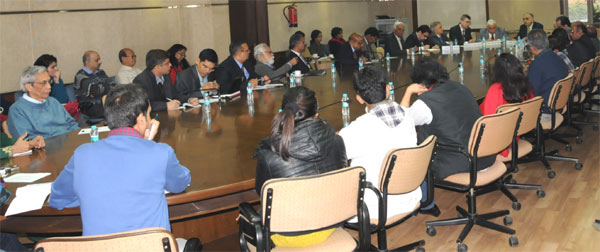
- This event has passed.
Talk by Mr. Falih Al-Fayyadh, National Security Adviser, Republic of Iraq
December 20, 2013

IDSA organized an interaction on Current Developments in Iraq and the West Asian Region on 20 December, 2013. A five member delegation from Iraq led by His Excellency Minister Falih Al-Fayyadh, National Security Adviser; Republic of Iraq gave insights into situation prevailing in Iraq and commented on the scope for India-Iraq ties. Dr. Arvind Gupta, DG IDSA chaired the talk.
A bilateral agreement was also signed between Institute for Defence Studies and Analyses (Delhi) and Al-Nahrain Center for Strategic Studies (Baghdad).
Following points were highlighted by Mr. Al-Fayyadh during his address:
Mr. Fayyadh stated that Iraq has successfully traversed from dictatorship to democracy after fall of Saddam Hussein. However, Iraq has transitioned from authoritarian to democracy under difficult conditions, and now faces the brunt of international terrorism, which is attacking the democratic process. In the last seven years, terrorism is the biggest challenge facing Iraq. He labeled the terrorism as an “unrealistic ideology” and emphasized that all the terrorist groups within Iraq operate under the umbrella of al-Qaeda. Terrorism in Iraq was “international” in nature, according to Mr. Fayyadh, who believed that this ideology was being protected and nurtured by rich countries in the region. The Minister however expressed satisfaction that the International community is now beginning to understand this and is willing to cooperate and assist Iraq in dealing with terrorism.
Regarding India-Iraq cooperation, he said that with around 7 million Indians working in Gulf, India has strong interests in the region. Significantly, India like Iraq faces same challenges from externally supported extremist groups. Therefore, with vital interest in the region and itself a victim of terrorism, it is logical that both India and Iraq cooperate over the issue of terrorism.

Mr. Fayyadh identified two ways of counter-terrorism cooperation between the two nations:
Direct cooperation: By transparency in exchange of information, experience-sharing and capacity building/investments in Iraq to enhance anti-terrorism infrastructure.
Indirect cooperation: To adopt anti-terrorism policy and voice the concerns at an international platform. He further added that there was a need to encourage diplomatic visits and exchange.
In conclusion, he reiterated the need and scope for strengthening India-Iraq relations.
Open Discussion:
Following issues were raised in the subsequent session:
Foreign involvement and terrorism in Iraq:
Mr. Al-Fayyadh acknowledged involvement of foreign hand in funding and supporting terrorist groups. He stated that while most of the infiltration was happening from Syria, the funding was coming from some Gulf countries and the fighters on the ground belonged to different nations.
Sectarian divide in Iraq:
He dismissed the claims of sectarian strife in Iraq and emphatically stated that the ultimate victims of such attacks were innocent masses. He added that Iraq was a multi-cultural society represented by ethnic diversity and Shia-Sunni differences were labeled as unrealistic and exaggerated. “The war in Iraq was a war of extremism”, Mr. Fayyadh stated.
Iraq’s perception of Arab Spring:
Mr. Fayyadh said that the rebels had tarnished the image of Arab Spring by mis-using terrorism as a tool against existing regimes. According to him, the uprising was at best an “extremists’ spring”
Separatism and Kurdish Issue in Iraq with reference to recent oil deal between Kurdistan and Turkey:
He asserted that oil and gas resources belong to all the people of Iraq and admitted that there were disputes between Federal Government and KRG regarding use of oil and gas resources. While addressing the issue of distribution of revenue from Oil-Gas trade, he stated that legislation on Oil-Gas resources was in the pipeline but political disputes were a major hindrance.
Iraq-Turkey relations:
Mr. Fayyadh stated that both the nations enjoyed very cordial relations till the rise of Arab Spring. However, shift in Turkey’s foreign policy from “non-interference in internal affairs to harsh interference” has altered the equation. Turkey’s interference in Syria was tagged “unreasonable and unwise”
Iraq’s take on situation in Afghanistan post-2014:
Mr. Fayyadh stated that unlike Iraq which has significant oil wealth, Afghanistan is relatively poor (Fakir) and will have to bank upon foreign aid to ensure political stability after withdrawal of US and NATO troops. He pointed that Iraq has been making huge investments in anti-terrorism activities. For Afghanistan to deal with the threat of terrorism, financial help from international community remains indispensible. Referring to US troops in Afghanistan post 2014, he gave example of US-Iraq Status of Forces Agreement (SOFA) and stated that even in presence of US troops Iraq witnessed high levels of violence. In 2006 alone, 50 cars had exploded in the Baghdad. He added that there is critical need for sincere support and economic help from Afghanistan’s neighbours.
Iraq’s outlook towards Iran-US nuclear deal:
Mr. Fayyadh affirmed that Iraq was in favour of any deal or policy which ensures peace in the region. According to him, “Iraq was perhaps a unique state which has been able to maintain cordial ties with both US and Iran”. He added that both US and Iran have accepted Iraq’s foreign policy stance and have not pressurized Iraq to deviate from its stated position.
Prepared by Ms Divya Malhotra, Intern, West Asia Centre, IDSA
Amended
Under “Foreign involvement and terrorism in Iraq”, ‘Saudi Arabia’ was erroneously & inadvertently mentioned. The speaker had used the phrase “the Gulf Region”. The error is deeply regretted and has since been rectified.
The Royal Embassy of Saudi Arabia, in a rejoinder objecting to the mention of the name of the Kingdom of Saudi Arabia, has also pointed out that “The Kingdom has been in the forefront of the international efforts of countering terrorism, eradicating terrorists and combating terror financing. It has taken many initiatives and measures in this regard, including signing in 2011 an agreement with the United Nations Counter-Terrorism Centre (UNCCT) and donating $10 million towards its creation. In 2013, the Kingdom pledged another donation of $ 100.millions for the Centre.







